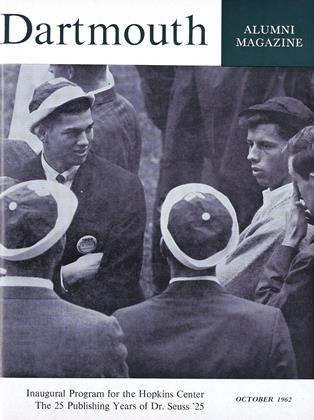Last June some strange looking people came to Dartmouth and some unusual things happened. Who came? There were 95 delegates from 45 national unions of students from around the world. At home each delegate is a national student leader which may mean he is 35 years old; a lawyer who negotiates with his government to secure appropriations for higher education; a member of Parliament; or a leader of a national political party or movement. Some are exiles and some have been imprisoned and tortured for opposing governing regimes.
In addition to the delegates there were two Danish technicians to install and maintain the translating equipment; six interpreters from Geneva; five racism panel members from the United States, two of whom were free on bail awaiting trial for integrationist activities in the South; a 17-member Dartmouth student committee; and six officials from COSEC. Grand total: 132.
COSEC is the permanent Secretariat for the International Student Conference (ISC), which is an association of eighty national unions that meets bi-annually. The Seminar (ISS) always precedes the Conference and is sponsored by COSEC. In 1960 the Seminar was held in Lund, Sweden, and the Conference in Klosters, Switzerland; in 1962 the' Seminar was held at Dartmouth College and the Con- ference at Laval University in Quebec.
The Seminar had two purposes. First, to serve as a forum for discussion. The topic was “The Role of the National Un- ion of Students Amidst Social Change.” Naturally there was much politicking too, i.e., lining of support for resolutions to be brought up at the ISC. Second, to give the delegates a chance to get to know one another informally.
What went on? When the delegates arrived they were greeted by The Dart-mouth printed in the three official lan- guages of the Seminar: French, English, and Spanish. At the first plenary session Michael Harrington spoke on student commitment in the United States since 1900 and Mssr. Chonderli of the FLN spoke on the emerging nations. Congratu- latory telegrams were read from Presi- dent Kennedy, Adlai Stevenson, Ralph Bunche, and others. That evening the delegates had dinner in the homes of Dartmouth professors and administrators. Twenty-six families were kind enough to have guests for supper and a reception for 250 Hanover residents followed in College Hall. There were some disap- pointments. The delegate from Uganda entered the reception and asked Peter Brink ’62 if there would be dancing. Peter said no. The delegate replied, “I want to go home.”
Two days later, after seminars on Il- literacy and Agrarian Reform, people began to tire of the heavy workload often ten hours of meetings a day. Bill Fitzhugh ’64 suggested the Canoe Club for a party after the evening meetings were over. Everybody walked down to the Connecticut in the dark for beer and canoeing. Even the Latin Americans, a wonderful but reticent group, were still there at 2 a.m.
The next day was a day of rest! Three buses took everyone to the Flume, to the Cannon Mountain Tramway for a ride to the top, to Echo Lake for swimming, and then to Moosilauke for an evening of volley-ball round robins, a banquet prepared by A 1 Merrill, and skits from nearly every country represented there.
Monday, the 25th, was the last full day. When President Dickey addressed the group the preceding Thursday he in- vited them to his garden for punch for their last evening in Hanover, for many their last evening in the United States. So just before going to the Hanover Inn for the final banquet everyone had a chance to visit the home of the President of the College. It was a wonderful occa- sion.
The Dartmouth students who worked on the Seminar are proud to have been permitted to hold it at the College. Con- siderable responsibility lay with the student committee, always with the benev- olent guidance of faculty and administra- tion. Mr. Donald Cameron of the Place- ment Office served as the College Officer in charge and he worked tirelessly. In addition to having the satisfaction of knowing that we might have helped a foreign student less fortunate in certain things than ourselves to see clearly for himself what an American student and college can be, the Seminar did other things for Dartmouth.
It’s now clear that this type of confer- ence is not unusual; they are quite com- mon and so are the problems and as- pirations of the people who attend them students. If having the Seminar some- how increased the sensitivity and aware- ness of our community, what greater reward could we ask? Today it’s not un- common for a college to accept this role. Indeed, it has an obligation to its stu- dents and to society. Dartmouth has responded to this chal- lenge. But there’s much still to do.
An informal moment between Dartmouth Hall sessions and (r) a volleyball game during the outing to Moosilauke.
Chairman, Dartmouth ISS Committee
 View Full Issue
View Full Issue
More From This Issue
-
 Feature
FeatureDr. Seuss
October 1962 By CLIFFORD L. JORDAN '45 -
 Feature
FeatureThe Vanishing Ability To Write
October 1962 By George O’Connell -
 Cover Story
Cover StoryThe Big Day Draws Near
October 1962 -
 Feature
FeatureTRUSTEES SANCTION A FOURTH TERM
October 1962 -
 Article
ArticleTHE FACULTY
October 1962 By George O’Connell -
 Sports
SportsWITH THE BIG GREEN TEAMS
October 1962 By Dave Orr ’57
Article
-
 Article
ArticleNew College Calendar
January 1949 -
 Article
ArticleMoral: Pay Attention in Math Class
OCTOBER • 1987 -
 Article
ArticleSkies
DECEMBER 1996 -
 Article
ArticlePAST MONTH'S RESULTS
DECEMBER 1967 By ALBERT C. JONES '66 -
 Article
ArticleMY FATHER'S GARDEN IN VERMONT
MARCH 1963 By EUGENE VANCE '57 -
 Article
ArticleThe Return of the Log-Peeler
January 1961 By GEORGE R. ANDREWS '37

